 MyDogBreeds
MyDogBreeds Jack Russell Terrier is originated from United Kingdom but American Mastiff is originated from United States. Jack Russell Terrier may grow 53 cm / 20 inches shorter than American Mastiff. Jack Russell Terrier may weigh 82 kg / 180 pounds lesser than American Mastiff. Jack Russell Terrier may live 4 years more than American Mastiff. Jack Russell Terrier may have more litter size than American Mastiff. Both Jack Russell Terrier and American Mastiff requires Low maintenance.
Jack Russell Terrier is originated from United Kingdom but American Mastiff is originated from United States. Jack Russell Terrier may grow 53 cm / 20 inches shorter than American Mastiff. Jack Russell Terrier may weigh 82 kg / 180 pounds lesser than American Mastiff. Jack Russell Terrier may live 4 years more than American Mastiff. Jack Russell Terrier may have more litter size than American Mastiff. Both Jack Russell Terrier and American Mastiff requires Low maintenance.
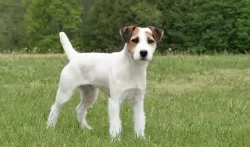 The popular Jack Russell Terrier was developed in Devonshire in the south of England in the late 1800's so as to hunt foxes.
The popular Jack Russell Terrier was developed in Devonshire in the south of England in the late 1800's so as to hunt foxes.
Often believed to be the Parson Russell Terrier, the Jack Russell Terrier was developed by Parson John Russell. This is where the dog gets his breed name from. Some people get the Jack Russell Terrier a little bit mixed up with the Parson Russell terrier, when it fact its actually a different breed, but sharing a common ancestry.
The Jack Russell Terrier is smaller than the Parson and bigger than the Russell Terrier. The breed became known in the U.S. by the 1930s and the Jack Russell Terrier Association of America wanted recognition by the American Kennel Club, which was granted in 2000.
 The history of the American Mastiff is entirely tied to the old European Mastiffs but in particular the English Mastiff. The developers of the American Mastiff crossed the English Mastiff with the Anatolian Mastiff at the Ohio kennel, Flying W Farms. The founder of this breed is Fredricka Wagner. Because of this the English Mastiff and the American Mastiff look very much alike. The difference between the two is that the American Mastiff was bred to have less health concerns than the English Mastiff and without the drooling. In 2000 the CKC acknowledged that the American Mastiff and the English Mastiff were separate breeds.
The history of the American Mastiff is entirely tied to the old European Mastiffs but in particular the English Mastiff. The developers of the American Mastiff crossed the English Mastiff with the Anatolian Mastiff at the Ohio kennel, Flying W Farms. The founder of this breed is Fredricka Wagner. Because of this the English Mastiff and the American Mastiff look very much alike. The difference between the two is that the American Mastiff was bred to have less health concerns than the English Mastiff and without the drooling. In 2000 the CKC acknowledged that the American Mastiff and the English Mastiff were separate breeds.
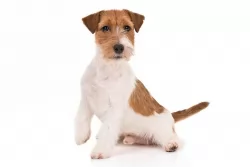 The Jack Russell Terrier is a small dog that weighs between 6 and 8kg and stands at between 25 – 38cm. The body length of the dog should be in proportion to the height.
The Jack Russell Terrier is a small dog that weighs between 6 and 8kg and stands at between 25 – 38cm. The body length of the dog should be in proportion to the height.
He is essentially a white dog with orange or fawn colored patches. The coat is mostly smooth and short, but the coat can also be longer and rough or it can be broken which is a combination of rough and smooth. Regardless of coat type, they are dense, double coats which will require brushing at least twice a week to remove loose hairs. He may also be tri-colored such as being white with black and tan patches.
He has alert, bright dark brown eyes and ears which are somewhat erect and which flop over at the tips. The tail has always been traditionally docked, giving him an attractive, compact look about him but unfortunately the tail is often left long on the dog these days.
Your Jack Russell Terrier is a lively, tenacious, bold, fearless, feisty, cheeky, confident, independent, intelligent and full of life dog. He is super energetic and exuberant, spirited and full of personality.
There are some dog owners who are exhausted by him and would prefer a more quieter dog breed as their companion. Nonetheless he has some excellent characteristics such as being a totally devoted and loving dog.
It is why it is a good idea to have him trained and socialized as it calms him down and makes him more obedient. He is very intelligent and training him will be easy.
 This crossing of the English Mastiff and the Anatolian Mastiff resulted in a Mastiff with a much drier, less drooling mouth than the other Mastiffs. This is a giant, massive dog – powerful and muscular. With a wide head that is rectangular rather than square. Their eyes are dark amber, and their ears are high on their head and rounded. With a medium size muzzle, black mask and heavy head, the American Mastiff is a handsome dog.
This crossing of the English Mastiff and the Anatolian Mastiff resulted in a Mastiff with a much drier, less drooling mouth than the other Mastiffs. This is a giant, massive dog – powerful and muscular. With a wide head that is rectangular rather than square. Their eyes are dark amber, and their ears are high on their head and rounded. With a medium size muzzle, black mask and heavy head, the American Mastiff is a handsome dog.
Their chest is broad, deep with ribs that extended backward. He has strong legs that are parallel and wide set. He also has a long tail. Puppies of the American Mastiff are born almost black and as they grow their coat color lightens. In addition, it is important that they have a wrinkled forehead as well and a scissors bite is preferred.
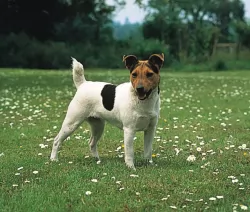 With loads of vibrant personality, the energetic Jack Russell Terrier has got so many wonderful characteristics to his name – devotion, intelligence, charming, lively, playful and he is an entertainer – you’ll always be laughing a him.
With loads of vibrant personality, the energetic Jack Russell Terrier has got so many wonderful characteristics to his name – devotion, intelligence, charming, lively, playful and he is an entertainer – you’ll always be laughing a him.
You do need to pay him attention – you can’t just plonk him in your backyard and forget about him. He wants your love and attention and ignoring him can lead to problem behavior such as obsessive barking.
Give your Jack Russell Terrier all the love and care he needs, and you’ll have an exceptional pet and friend.
 A love of children and devotion to his pack (family) is bred into the American Mastiff. He is non-aggressive unless you threaten his family or his children. Then he becomes courageous, protective and defensive. This is a gentle giant most of the time, however due to size and the need for strong leadership, the American Mastiff should be socialized and trained early. If they are socialized and trained they will be calm, gentle dogs. They will remain protective and alert, but they will be friendly with strangers. They love to please their people and being highly intelligent they learn fast.
A love of children and devotion to his pack (family) is bred into the American Mastiff. He is non-aggressive unless you threaten his family or his children. Then he becomes courageous, protective and defensive. This is a gentle giant most of the time, however due to size and the need for strong leadership, the American Mastiff should be socialized and trained early. If they are socialized and trained they will be calm, gentle dogs. They will remain protective and alert, but they will be friendly with strangers. They love to please their people and being highly intelligent they learn fast.
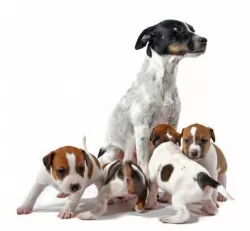 This particular dog breed has a reputation for being healthy and living to a good age such as 16 or 17 years of age. Of course he needs to be given proper care to reach such a good age.
This particular dog breed has a reputation for being healthy and living to a good age such as 16 or 17 years of age. Of course he needs to be given proper care to reach such a good age.
Some common dog disorders you might want to be aware of are -
Lens luxation is actually a common hereditary disorder in these dogs, but even so, with good care, your dog isn’t likely to battle with it. What happens is that the lens in the eye becomes displaced. There are two types, with Posterior luxation being the lesser severe one.Treatment is available.
Patellar luxation is an hereditary disorder affecting the knees of the dog. The kneecap slips off the groove where it sits and you may notice your dog running while holding his hind leg in the air. It can sometimes slip back in place and then you see your dog running in his usual way. It becomes more serious when it affects both legs.
 American Mastiffs seem to have fewer health issues than other larger giant breed dogs. However, they can experience allergies as many large, wrinkled dogs do. They also might have a tendency toward eye issues, hip dysplasia, cancer and heart disease. Bloat might be the most life-threatening issue many American Mastiffs experience.
American Mastiffs seem to have fewer health issues than other larger giant breed dogs. However, they can experience allergies as many large, wrinkled dogs do. They also might have a tendency toward eye issues, hip dysplasia, cancer and heart disease. Bloat might be the most life-threatening issue many American Mastiffs experience.
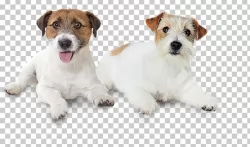 The Jack Russell Terrier isn’t just a small dog that can be left to his own devices. He will need proper training and socialization early in life to make him obedient and better to get on with.
The Jack Russell Terrier isn’t just a small dog that can be left to his own devices. He will need proper training and socialization early in life to make him obedient and better to get on with.
He may be a small dog, but he certainly won’t do in the city where he is cooped up in a place with a handkerchief of a garden. He needs lots of space to run and play. He wants his human family to join in with walks, hikes, ball games and swimming.
You can buy excellent commercially manufactured dog food which caters for energetic small dog breeds like the Jack Russell Terrier.
Once you have selected the best one for your pet, with dry kibble being better in terms of dental health - you can also add in some brown rice, vegetables and cooked chicken. This is highly beneficial to all dog breeds. A little bit of raw meat can sometimes be added in too.
The bottom line is to to prevent your pet from eating foods high in preservatives, additives and fillers. Never leave your pet without a constant supply of fresh, cool water.
 Giant breeds like the American Mastiff are known for growing rapidly as a puppy and therefore proper feeding and nutrition is essential. The slower your American Mastiff grows, the better. Make sure your puppies get enough phosphorous and calcium in their high calorie diet. Free feeding is not recommended. Feed puppies up to 4 small meals per day and feed adults twice a day.
Giant breeds like the American Mastiff are known for growing rapidly as a puppy and therefore proper feeding and nutrition is essential. The slower your American Mastiff grows, the better. Make sure your puppies get enough phosphorous and calcium in their high calorie diet. Free feeding is not recommended. Feed puppies up to 4 small meals per day and feed adults twice a day.
As previously mentioned this breed is a fairly healthy one, There, are however, certain evaluations you should do with your American Mastiff puppy to be sure she is in good health. These tests would include an elbow and hip evaluation to check for dysplasia. He should have an ophthalmologist and cardiologist examine him as well. Most American Mastiffs will not have any problems, but these evaluations will help to prepare you if they do. The wrinkles in your dogs; face, around the eyes and muzzle must be kept clean as they can become infected if you don’t.
Unlike the way he looks, the American Mastiff is not a couch potato, but neither are they a high energy, exercise machine. They do well living in apartments or homes, with or without a fenced in yard. They need a long walk every day. They need mental stimulation through exercise and games. Make sure they learn to love to play so that they don’t become lazy as they age.